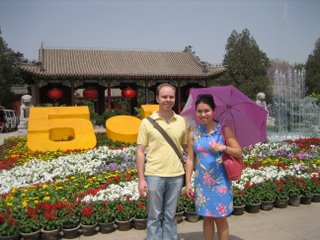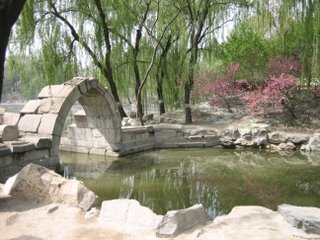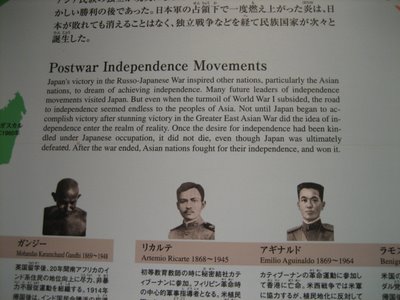
Friday, July 28, 2006
Tuesday, July 25, 2006
Dashanzi exhibition
Saturday, June 10, 2006
Photos from Guilin and Yangshuo
Friday, June 02, 2006
Today, Beijing, tomorrow, Guilin!
From the Economist
Atomised
From The Economist print edition
Beijing no longer commands instant obedience from China's local authorities
 | |
THE Chinese Communist Party is a highly centralised beast, with a power structure little changed from the days of Mao Zedong. Over the next year or so it will be engaged in what official reports describe as one of the biggest shuffles of leaders at every level, with hundreds of thousands due to change their jobs. Nominally, appointments are made by local party committees. In practice top appointments in the provinces have always been made by leaders in Beijing. But that does not mean that Beijing is in complete control.
A good career in the party still depends on following, or at least appearing to follow, the centre's orders. But local leaders calculate that as long as their areas achieve rapid economic growth with minimal unrest, then they have considerable leeway to do as they will. The party no longer really frets about the ideological purity of its leaders. And since the days of Mao each new generation of leaders in Beijing has been increasingly less able to command instant obedience across the country.
To be sure, China is not heading towards a break-up, anarchy or the warlordism of the pre-communist era. The armed forces and the police remain under the party centre's grip. At the provincial leadership level, too, the authority of the centre is secure. Many residents of regions with large numbers of ethnic minorities, especially Tibet and Xinjiang, resent being controlled by Beijing, but their leaders are party loyalists. Provincial leaders, in fact, display far more ideological harmony than was the case in the 1980s or early 1990s. At that time, some were conspicuously conservative or reformist. Ye Xuanping, a popular native leader of Guangdong Province next to Hong Kong, was often reported to be building the region into a personal power base. Worried central leaders moved him to a sinecure in Beijing in 1991.
The problem today is more a profusion of township, county and prefectural leaderships whose efforts to propel growth in their regions produce impressive statistics, but often at a heavy social, environmental or macroeconomic cost. In the last two years the government has been worrying that the economy might overheat and has been trying to curb investment in industries whose capacity has been growing too quickly. But local officials have often simply ignored these measures. As Zhang Baoqing, a former deputy minister of education, put it to an official newspaper last year, China's biggest problem is that orders issued in Zhongnanhai, the party headquarters in Beijing, sometimes never leave the compound.
 | |
In March last year, amid growing public complaints about fast-rising house prices, the government issued directives aimed at cooling the market. Shanghai, the main target of these measures, dutifully tightened controls. But house prices in other big cities have climbed rapidly—Beijing's by more than 17% in the first two months of this year compared with the same period a year ago. Beijing's city government is not entirely to blame. Demand is growing as the city prepares to host the Olympic Games in 2008. Interest rates are low. China is reluctant to raise them sharply for fear of putting further pressure on the yuan to appreciate. That could hurt exports and push up unemployment.
But local governments control land supply and have a vested interest in keeping prices high. In 1994 the central government changed the way it shared tax revenues with the provinces, leaving the centre with a much bigger portion. But sub-provincial governments still shoulder the main burden of the provision of health care and schooling (which they do only patchily). Land-related transactions have become a crucial source of local governments' revenue. They are further helped by their ability to persuade state-owned banks—ill-equipped to make sound lending decisions—to grant loans.
In the late 1990s, when China began to privatise urban housing, the central government ordered that the bulk of new housing projects should be low-cost and restricted to middle- and lower-income families. Developers of such housing were to be given big tax benefits. But local governments saw little to be gained. In Beijing only one-tenth of new housing space belongs to this category. Regulations announced this week require local governments to boost the supply of cheap housing. There will not be an enthusiastic response.
Local leaders rarely incur heavy political penalties for failing to carry out the central government's economic directives. Officials in Beijing frequently order clampdowns on the makers of pirated goods. Offending factories are sometimes closed. But local officials who condone such operations as a way of boosting their local economies are seldom punished. Nor are officials who turn a blind eye to polluting industries, unless they cause big accidents or trigger unrest. Transgressions are so widespread that it would be destabilising to launch a crackdown. But just to make sure that career-damaging information does not reach Beijing, local governments often arrest petitioners who travel to the capital to raise complaints.
Central leaders are comforted by the knowledge that direct political challenges to their authority by local governments are extremely rare. Li Fan, an independent consultant in Beijing who advises local governments on election-related issues, says there is strong demand among lower-level officials for political reform. But very few rural townships have pushed experiments with freer elections or more open government beyond the party's guidelines. And none has tolerated organised opposition or open attacks on the party leadership. China's local leaders know where to draw the line.
Friday catblogging!

Finally, I get to participate in Friday catblogging, invented/popularized by Kevin Drum, whose blog I scarcely read except for the cute cat photos.
We adopted a kitten from Animal Rescue Beijing a couple weeks ago. Her name is 美美 (meimei, pronounced may-may) and she's nearly a year old, or so we guess from her size. I was persuaded to adopt her by the kindly lady below, who says she rescued Meimei herself from the streets of Hainan, a tropical island off of China's southern coast. Meimei had apparently been living off scraps of food discarded by people at a street food stand. Her leg has healed completely, so despite her "handicap," she regularly tears up the apartment each night, sleeping during the day (see photo above).

Wednesday, May 17, 2006
Beijing Swings!
- adjective: Of or relating to dancing.
- noun: A dancer.
The word Terpsichore is the feminine form of terpsichoros (delighting in the dance), a combination of Greek terpein (to delight) and khoros (dance), which is ultimately from Indo-European root gher- (to grasp or to enclose) that's also the source of chorus, carol, choir, garth, court, and garden.]
--------
To my delight, Beijing has a lively swing & lindy hop scene! Jeremy and I went last Thursday and I went again on Monday. Even though I've been away from swing dancing for a good while, it was wonderful. It was as close to Stanford as I'd seen in a long time - just on a smaller scale, with more Chinese thrown in.
Sunday, May 07, 2006
Friday, May 05, 2006
That Tokyo conference
WASHINGTON - Last month, the chief U.S. negotiator with North Korea wanted to meet privately with his North Korean counterpart, hoping he could persuade Pyongyang to return to talks on eliminating its nuclear weapons program.
But the meeting between U.S. Assistant Secretary of State Christopher Hill and North Korean Vice Premier Kim Kye Gwan on the sidelines of a conference in Tokyo never took place.
Hill's superiors in Washington forbade him from talking directly to the North Koreans, said three U.S. officials, a conference participant and another knowledgeable expert. All requested anonymity because of the sensitivity of the issue.
...
Hill, the assistant secretary of state, was urged to attend the Tokyo conference after two senior North Korean diplomats agreed in consultations involving two former senior American diplomats that it would be a chance for him to meet privately with Kim, the North Korean envoy, according to a person with knowledge of the discussions who asked to remain anonymous.
This person and a conference participant said Hill saw it as a chance to persuade Kim to rejoin six-nation talks on eliminating North Korea's nuclear arms program. The isolated Stalinist regime has boycotted the talks since the United States took action to halt what it charges are Pyongyang-run money-laundering, drug-running and counterfeiting operations.
Kim met privately with officials from the other nations - Russia, China, South Korea and Japan - involved in the moribund negotiations, said three U.S. officials and the conference participant.
Speaking at a conference in Washington on Tuesday, Hill insisted that "it was my call" not to meet Kim.
"Is someone impeding me from having bilateral contacts? The answer is yes, and it's the DPRK (Democratic People's Republic of Korea)," he said. "We are not prepared to sit outside the six-party process and let the DPRK boycott the process and look for favors to get them back."
Wednesday, May 03, 2006
May Day
 This week is a national holiday in China, perfect for some R&R. The umbrella I'm holding is not for rain but to ward off the sun--it was 90 degrees! Here we're standing in front of the entrance to Yuanmingyuan, the Old Summer Palace (destroyed twice by foreign troops in the 19th century. Here's the official story)
This week is a national holiday in China, perfect for some R&R. The umbrella I'm holding is not for rain but to ward off the sun--it was 90 degrees! Here we're standing in front of the entrance to Yuanmingyuan, the Old Summer Palace (destroyed twice by foreign troops in the 19th century. Here's the official story)
The construction noise has started again upstairs. Fortunately, it was quiet when our guests came over yesterday. Our Chinese friend, Sarah, had her parents come up from
Monday, May 01, 2006
The infamous Yasukuni Shrine
Sunday, April 30, 2006
The best bread of my life
Saturday, April 29, 2006
Saturday, April 08, 2006
Outside our hotel in Tokyo

 Outside our hotel in Tokyo, there are riot police stationed... for fear that right-wing Japanese groups will harass the North Koreans.
Outside our hotel in Tokyo, there are riot police stationed... for fear that right-wing Japanese groups will harass the North Koreans. Background on the North Korea-Japan abductee issue
Thursday, April 06, 2006
To Tokyo
Sunday, April 02, 2006
Fulbrighter
Thursday, March 30, 2006
Old haunts












